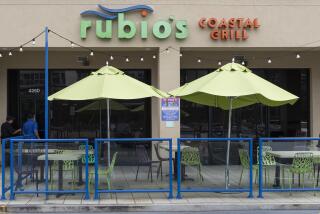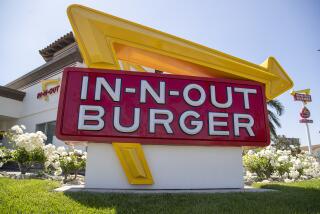Taco Bell to Buy Chevys, Expand It Nationwide : Restaurants: Sit-down chain specializes in lighter fare and de-emphasizes bar sales. Management will be given a free hand.
IRVINE — Taco Bell Corp. said Tuesday that it will buy the small, San Francisco-based Chevys Mexican restaurant company with the intent of expanding it into the first nationwide sit-down Mexican food chain.
Chevys now has 37 units concentrated mostly in the Bay Area. Irvine-based Taco Bell, which dominates Mexican fast food in the United States and has been looking to enter full-service dining, said it hopes to have at least 300 Chevys operating across the nation within five years.
Terms of the deal, which must be approved by directors of Taco Bell’s parent company, Pepsico Inc., were not disclosed.
Founded in 1986 in Alameda, Chevys has grown rapidly. Sales this year are expected to be about $100 million, triple sales four years ago.
The chain has tried to differentiate itself from the pack of Mexican restaurant chains with a “Fresh Mex” concept--emphasizing lighter fare and not depending as much on bar sales as do regional chains such as Chi-Chi’s, which has more than 200 restaurants, and El Torito, with about 175.
John Martin, Taco Bell’s president, said he plans to leave Chevys under the direction of its chairman, Mike Hislop, who took over two years ago with the goal of expanding the chain. Martin said the expansion will start as soon as the Chevys deal closes, probably in eight weeks.
By taking a hands-off approach to management of Chevys, Martin is likely to deflect concerns of analysts who have speculated that Taco Bell may not fare as well in the highly competitive full-service restaurant business as it has in fast food.
Taco Bell, for instance, has succeeded by using a low-price formula that depends largely on pre-preparation of food to hold down costs. Most of its fillings, for instance, come in plastic boil-in-bag packages, reducing the number of restaurant workers needed.
The full-service segment, however, involves more complicated recipes and higher labor costs. And so far, no Mexican restaurant chain has achieved national status.
“If any company can do it, Taco Bell can,” said Janet Lowder, a restaurant industry consultant based in Rancho Palos Verdes. “I think it’s a natural extension since they have had the opportunity to take fast-food Mexican to all corners of the United States. The next step up is full service with a casual theme.”
For parent Pepsico, “this is a rational way to dip their toe in the water,” said analyst Emanuel Goldman at the brokerage Paine-Webber Securities in San Francisco.
“Their interest is in the full-service dining part of the business because they have practically no position there.”
Pepsico, with annual revenue of more than $20 billion, also operates the Kentucky Fried Chicken and Pizza Hut restaurant chains.
More to Read
Inside the business of entertainment
The Wide Shot brings you news, analysis and insights on everything from streaming wars to production — and what it all means for the future.
You may occasionally receive promotional content from the Los Angeles Times.










